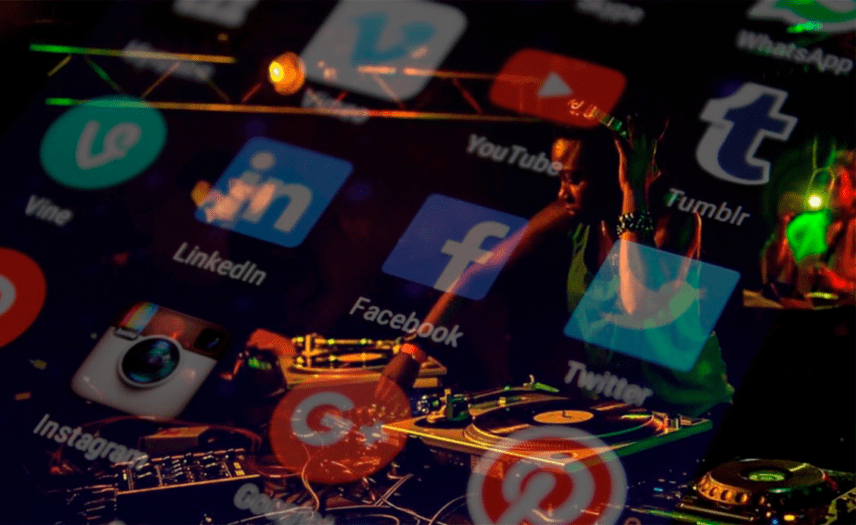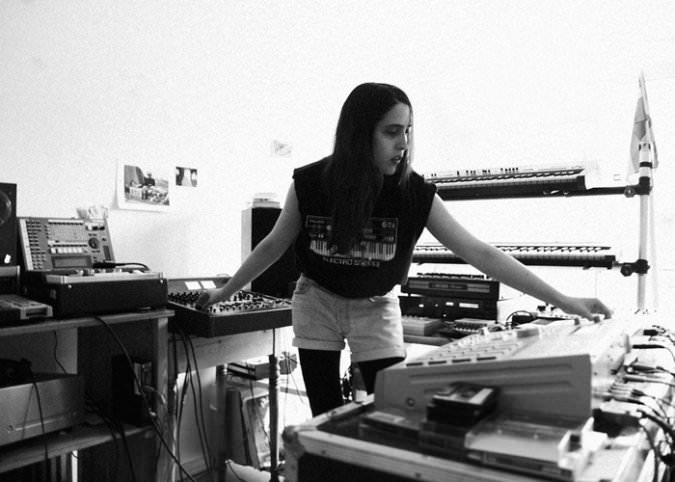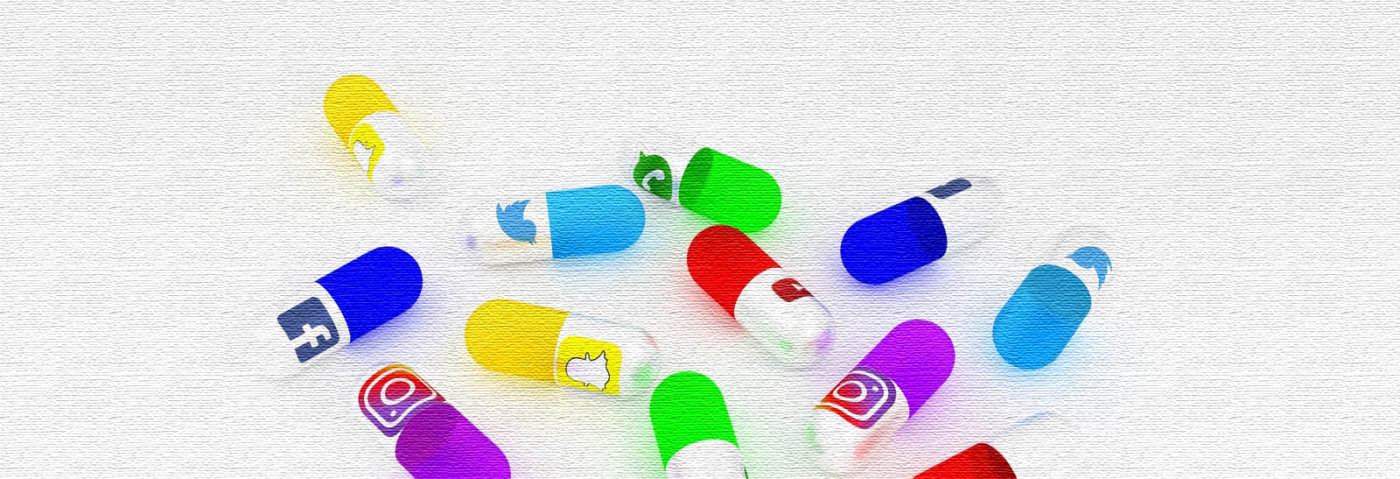Social media has undergone big changes in the last few years, and some of those changes have left artists feeling more lost than ever. In this article, which is part one of our three-part series on social media in electronic music, we’ll attempt to clear things up, exploring the continued importance of social media for artists, what happened to Facebook, and how platforms like Instagram have changed what success means for electronic musicians. In future articles, we’ll also be looking at how social media has impacted music and mental health, life for artists before and after social media, and what the future of artist-based social media platforms might look like.
The importance of social media in electronic music has been hotly debated over the years. Some say making or playing great music is all that matters — do that, and the rest will follow. But as we’ll see, it’s hardly that simple. And rapid changes to the social media landscape are only complicating things. Those changes have altered what it means to be a successful artist, and could exacerbate the already precarious position many obscure producers currently find themselves.
That isn’t entirely the fault of social media. With the rise of illegal downloading and streaming platforms like Spotify, earning an income from producing has become almost impossible. This has forced many musicians into the spotlight, where competition is fiercer than ever and maintaining a social media presence is now all but standard. Of course, not every successful artist has a social media presence. And forgoing a certain amount of exposure may help cultivate an allure of mystery. But for most touring electronic musicians — and especially newer artists — social media is now a necessity, as popularity on platforms like Instagram and Facebook goes hand in hand with career growth and stability. This new reality has sparked the ire of many artists, who view the sway of social media over the industry and motivations behind the platforms with increasing unease.

It wasn’t always this way. Around a decade ago, many musicians saw the introduction of Facebook and its artist pages as a boon. Myspace — once the internet’s favourite hub for musicians — was effectively over, leaving a gap in the market. “You could sense that artists were waiting for that opportunity,” says UK dubstep artist Plastician, whose real name is Chris Reed. The ability to easily share links to music or gigs with friends and fans, Reed says, made the platform an ideal place to build a community. “A lot of people who listen to my radio show used to engage on Facebook. And for quite a long time it was really quite useful.”
Those utopian times didn’t last forever. In late 2017 and early 2018, Facebook made changes to its algorithm that had far-reaching and damaging effects across multiple industries. Effectively, those changes were about reconnecting friends and family by prioritising people over businesses in the news feed. As Facebook CEO Mark Zuckerberg said in a statement at the time, unpaid posts by brands, media and business had overtaken posts by people. Not only did Zuckerberg see this as going against Facebook’s core mission as a social network, but research had shown that it might be bad for mental health. Or as Zuckerberg said, “when we use social media to connect with people we care about, it can be good for our well-being.” Mindlessly scrolling through a feed filled with posts by soft drink companies and brand influencers was perhaps less so.
Zuckerberg’s reasons for changing the algorithm certainly seem altruistic. Social media is widely understood to be toxic for our mental health, and in general, anything we can do to ease that toxicity should be celebrated. Indeed, Matthew Friedman, strategist for We Are Social, believes that Facebook really did want to “reestablish the platform as the place to have meaningful conversations with friends and family.” However, he also believes the algorithm change was used as a “justification and as a means of intentionally pushing down organic branded or publisher content in the news feed.” This made facebook a fully pay-to-play advertising platform. “It’s like any other digital space — Google AdWords or banner ads — you have to buy in in order to utilize it,” Friedman says.
Businesses across the internet that had come to rely on the news feed as their primary connection point to customers saw a dramatic drop in organic reach. The shift literally killed some small businesses, and had a damaging impact on news media and publishing. It also made it nearly impossible for many artists to reach the fans they already had without spending money.
“It had a massive effect on any organic reach, basically,” Reed says. Before the algorithm change, Reed says almost everyone who followed him was engaging with his posts. “I mean, I would get far more comments and engagement than anything to do with music, like a gig or video of a gig or a new track or something. Whereas now, I think I’ve got between 40 and 50 thousand followers, and recently I posted something and it said that it had been seen by three people. Three.”
It’s important to make an artist know that whether they like it or not, they’re a business first and an artist second — the world is what it is. And once you can start to understand the difference, things can start to happen
Along with demographic changes in who uses each platform, decline in organic reach is partly responsible for the artist migration from Facebook to Instagram. While in the future, Friedman thinks it will also be entirely pay-to-play like Facebook is, right now, it’s still very possible to grow on Instagram organically. It just depends on what you post. “Look at Derrick Carter,” Friedman says. “He posts an endless stream of memes — and they’re hilarious — but that’s a non-traditional way of marketing himself on a platform that doesn’t have to do with music. It’s effective. He’s got a huge following on social media because of it, and it’s treating yourself as a brand and building brand love around your personality.” While that works for some artists, others can’t help but feel frustrated about the situation, and understandably so. After all, most producers and DJs presumably didn’t launch careers in music to become part-time comedians.
In an ever-expanding and competitive market, however, many artists will continue doing whatever’s necessary to remain digitally relevant. “And relevancy is the most important thing when it comes to social media and your digital presence,” Eamon Chiffey says. A Melbourne native who speaks rapidly yet chooses his words carefully — almost scriptedly — Chiffey spent several years working in the digital sector, including for the “third-biggest cloud-based software platform out of Silicon Valley,” he says. Chiffey is a longtime dance music fan, and at the encouragement of friends in the industry, launched a social media and branding company called Trebl, which helps electronic music artists navigate the digital landscape. Chiffey now works with artists like DJ W!LD and Tom Trago. And in speaking to him, it becomes abundantly clear just how different the future of our industry is starting to look.
“It’s important to make an artist know that whether they like it or not, they’re a business first and an artist second — the world is what it is. And once you can start to understand the difference, things can start to happen,” he says. While Chiffey’s words may seem cold, they speak to a truth happening nearly everywhere in the industry. Streamers like NTS and Boiler Room have been intertwined with brands like Carhartt and Ballantines for years, replicating the branding success of many festivals and club nights. And now, more and more DJs are getting in on the action, eager to capitalize on what might be short-term success in the music industry with branding opportunities in fashion and alcohol. And as services like Chiffey’s become the norm in dance music scenes outside of EDM — where they’re already prevalent — the social media practices perfected by pop, EDM and major corporations like Coca-Cola will eventually find their way into more obscure music circles.
“I think with the advent of fashion, alcohol and other complementary products and or services, which marry in with music, that is starting to drive and upskill brands and artists, individually and collectively, to start to work together more to achieve a common goal,” Chiffey says. Major brands and pop acts have plenty of money to spend on new and untested theories on what best captures and holds customer attention on social media. Not only can people like Chiffey reverse engineer those ideas to work on a smaller scale and budget for his clients “in underground dance music,” he says, but as the Nike-sized companies of the world continue working closely with artists, they’ll bring their market tested ideas to any social media campaigns. And the market wants what it wants, which isn’t necessarily music.
“Just because you think something is cool doesn’t mean your audience does,” Chiffey says. “This is one of the challenges I find with my clients — it’s important to not think about what you like, but think about what your audience likes,” he says. That means if tasteful photos of art galleries aren’t performing well, but photos at the gig smoking a joint are, it’s time to begin replicating that success. “Although the artist thinks that’s really great because they love the art, no one engages with it because it doesn’t have the artist in it. And it’s art, which most fans don’t actually understand or get. But when they see a post of them smoking a joint in the booth, they’re like ‘fuck that’s sick,’ and they like, comment and share.”
So what about music? While Chiffey treads carefully around the subject, he does see social media as a place to share music, as long as it’s done in a way that encourages engagement. He also says he completely understands and respects artists who may not be comfortable with adopting an online persona, and that he’s spoken with potential clients big and small who felt this way, and walked away from working with them each time. But the world outside of the digital realm is quickly shrinking, with hundreds of digital marketing messages vying for your attention each day. Staying relevant without playing the social media game is only growing more difficult. And for artists wanting to break through, Chiffey believes it’s now nearly impossible.
“If you want to go from being an underground artist who’s playing warm-up slots in small bars and clubs, and get some national and international recognition, both as a producer and an artist, the only way to get noticed is by starting to become relevant in the digital space. That’s where people are going to start hearing about you. Other artists are going to be exposed to your music, play your music and then start to want to sign you and collaborate when it comes to performing and producing as well. And that’s the reality of the matter.”
That’s not to say it’s impossible for new acts to see some success without social media. Clubs like Berghain and Concrete in Paris regularly book exciting newcomers, some of whom have no online presence at all. But as booking agent Anastasia Anschiz says, capitalizing on that success without the help of social media is increasingly unrealistic. “Great. You got the chance to play at Berghain, and your music can be amazing, but you need to pick up from there,” she says. “It will always be a next step.”
Formerly at Artist Alife, Anschiz now works for The Bliss Office as a booker, and says having a funny or interesting online persona helps land bookings “more than ever.” For the smaller artists she represents, Anschiz says promoters now look at Instagram before Facebook, checking “how their look is, and how interesting the person is,” she says. She also says “they don’t look for the numbers anymore — they check the personality. It doesn’t matter if you’re a young act. We always tell our artists, make yourself as interesting as possible.”
Like Reed, Anschiz doesn’t see very much value in Facebook as an artist promotion tool anymore. “Especially for the young acts. Facebook, there’s no chance. It’s very hard. But Instagram, it’s still possible to make yourself a name very quick.” Anschiz points to Germany’s Andhim and Belgium’s Amelie Lens as examples of artists who skillfully showcase their personalities. Andhim have nearly 80,000 Instagram fans, and are known for quirky and funny posts — jumping on a hotel room bed, for instance. Lens, who’s skyrocketed to fame in recent years, has around 650,000 fans, who she keeps regularly updated with stories from the road, pictures of her cats and her gear, and most importantly for Anschiz, with personal moments. “She’s so intimate,” Anschiz says. “It’s more important to be this unique person instead of someone who’s just really into music, which is actually really sad — really sad,” she says. “But the people just want entertainment. It was always there in pop music and EDM, which is now coming to our genre because we’re growing. It was only a matter of time before we had these same kind of mainstream DJs, because our scene is getting big and people are getting more money than ever.”
Facebook isn’t considered completely irrelevant by everyone in the industry. Anschiz says many promoters still use paid posts to advertise upcoming parties, making use of Facebook’s targeting options to reach specific audiences across age, geography, gender and interests. But Reed and others don’t want to have to pay to reach the fans they already have. And with Facebook plagued by political scandals, artists like Nils Frahm are deciding to leave the platform — including Instagram, which is owned by Facebook — completely behind.
To be sure, there are some successful artists in electronic music who don’t use social media. Ricardo Villalobos, Burial and Aphex Twin are notoriously social media shy, and remain some of dance music’s biggest acts. But Villalobos and Aphex Twin have careers that span well beyond the era of social media. Their fans are older and perhaps still buy music. The press almost always ensures their releases and tours are talked about, and the mythical aura around their live performances remains as strong as ever — no self promotion needed. As for Burial, his debut album and its follow up were so good, some speculated he might be Aphex Twin, Four Tet or Fatboy Slim. He was also nominated for a Mercury Prize. And despite his anonymity, promoters were likely salivating at the thought of booking the mystery dubstep producer at major festivals around the world.
Then there’s Helena Hauff, whose career has more closely coincided with the Instagram age. But without using Facebook, Instagram, or even Twitter, the Hamburg-based techno DJ and producer has become a regular on the international festival circuit, playing the likes of Time Warp, Awakenings, and Creamfields in 2019. “She’s mysterious, which also works,” Anschiz says. And her blistering sets, comprising EBM, acid and electro, also help set Hauff apart from most other techno acts. But like Nils Frahm, Villalobos, and Burial, artists like Hauff are the exception, not the rule. Their fans are already digging and looking for new music. “So those artists don’t need to be on the surface promoting themselves as much,” Friedman, who is also a DJ and producer, says. “The people they cater to prefer to dig for that knowledge and music on their own.”

So where does this leave everyone else? For the artists who may not make or play the kind of music that Berghain will notice — or earn them a Mercury Prize — the option to stay away from social media is increasingly limited. The consequences this will have on the industry are still uncertain. Faceless producers have long served dance music well, writing the bulk of the records fame-hungry DJs play to packed crowds each week. And while Spotify and streaming share much of the blame for threatening to starve these producers, by continuing to prioritize persona over music, we may well finish the job.
Chandler Shortlidge is a dance music journalist based in Berlin. Follow him on Twitter.

10.21 AM
I really dislike how you guys keep trying to pull this crap into the underground/electrnc music etc. Please Stop! What you dont have enough clicks?